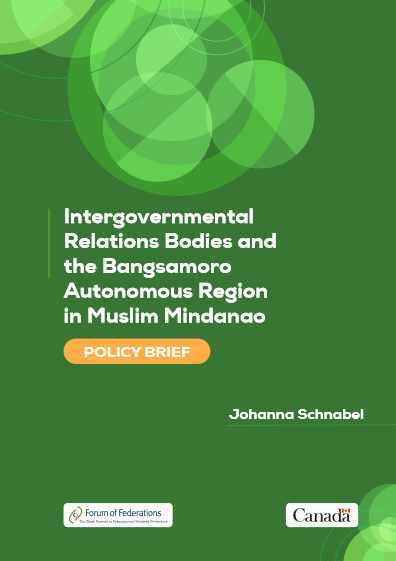Bibliothèque

Language:
EnglishTopic:
Bangsamoro, IGR & Coordinate Development PlanningCollection:
Conference ReportsCountries:
PhilippinesAuthors:
Publication Year:
2022
This Policy Brief was produced with the generous financial support
of Global Affairs Canada and produced by the Forum of Federations
through the Supporting Decentralized and Inclusive Governance in the
Philippines Programme. The views expressed here are those of the
author and do not reflect the views of the Canadian Government.
Autonomy can be a useful tool to resolve conflict between different groups within a
country. As a mechanism to accommodate demands for self-governance it can help
maintain peace. Yet granting formal autonomy is only the first step. Filling autonomy with
life is the second necessary step. But achieving genuine self-governance is also a major
challenge. Making autonomy work requires regional capacity and appropriate financial
resources. Moreover, autonomy is contingent on a sound relationship between national
and regional authorities.
However carefully designed the autonomous status of a region is, there will necessarily be
jurisdictional overlaps. A range of matters may fall within the concern or responsibility of
both the autonomous region and the national government, requiring their coordination.
This is the case when the autonomous region administers national law, the national
government and the region exercise concurrent powers, or when issues cut across
jurisdictions. The scope and design of autonomy is often an ongoing process and may need
to be revisited regularly. Therefore, intergovernmental relations (IGR) are an important
aspect of how autonomy operates in practice.
The main challenge is to ensure that the national government respects regional autonomy.
It must not impose rules and regulations on matters of regional jurisdiction, nor must it
change policymaking powers and financial endowments unilaterally. Therefore, national
authorities and regional authorities should work together as partners—which requires
strong and effective intergovernmental bodies.
The Bangsamoro Administrative Code stipulates that IGR will be based on mutual respect,
the recognition of (regional and national) authority, and the acceptance of interdependence.
Whether these principles will be adhered to depends on how intergovernmental structures
operate.
Carefully designed intergovernmental structures provide a framework in which national
and regional authorities can collaborate as partners in respect of their autonomy. A setting
in which the national government can dictate how regional affairs are conducted, treating
regional authorities as its agents, must be avoided. Formal structures of IGR are most
successful if supported by informal relations, both at the political and administrative level.
Parliamentary scrutiny is another contributor to success since it fosters transparency and
accountability.
This policy brief reviews the newly created intergovernmental structures and examines
their potential to achieve genuine self-governance in the Bangsamoro Autonomous
Region

